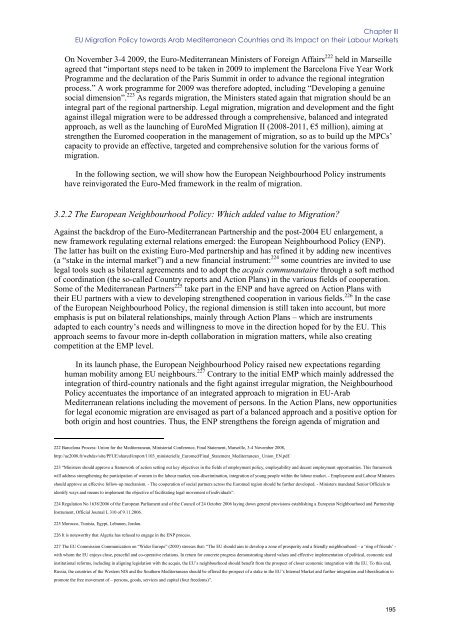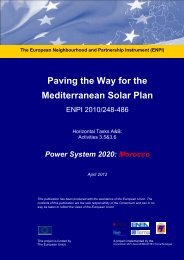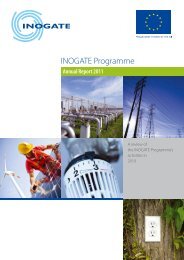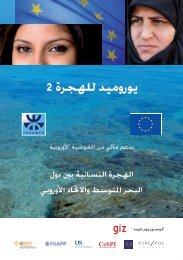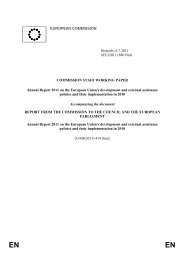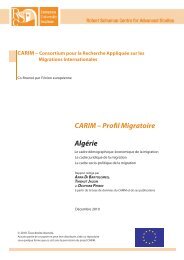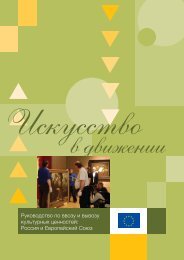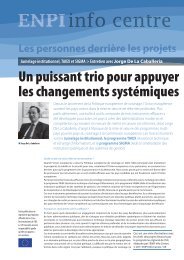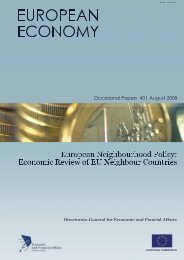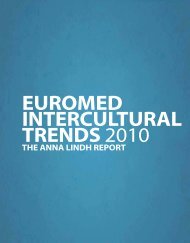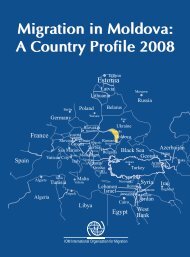Labour market performance and migration flows - European ...
Labour market performance and migration flows - European ...
Labour market performance and migration flows - European ...
Create successful ePaper yourself
Turn your PDF publications into a flip-book with our unique Google optimized e-Paper software.
Chapter IIIEU Migration Policy towards Arab Mediterranean Countries <strong>and</strong> its Impact on their <strong>Labour</strong> MarketsOn November 3-4 2009, the Euro-Mediterranean Ministers of Foreign Affairs 222 held in Marseilleagreed that “important steps need to be taken in 2009 to implement the Barcelona Five Year WorkProgramme <strong>and</strong> the declaration of the Paris Summit in order to advance the regional integrationprocess.” A work programme for 2009 was therefore adopted, including “Developing a genuinesocial dimension”. 223 As regards <strong>migration</strong>, the Ministers stated again that <strong>migration</strong> should be anintegral part of the regional partnership. Legal <strong>migration</strong>, <strong>migration</strong> <strong>and</strong> development <strong>and</strong> the fightagainst illegal <strong>migration</strong> were to be addressed through a comprehensive, balanced <strong>and</strong> integratedapproach, as well as the launching of EuroMed Migration II (2008-2011, €5 million), aiming atstrengthen the Euromed cooperation in the management of <strong>migration</strong>, so as to build up the MPCs’capacity to provide an effective, targeted <strong>and</strong> comprehensive solution for the various forms of<strong>migration</strong>.In the following section, we will show how the <strong>European</strong> Neighbourhood Policy instrumentshave reinvigorated the Euro-Med framework in the realm of <strong>migration</strong>.3.2.2 The <strong>European</strong> Neighbourhood Policy: Which added value to Migration?Against the backdrop of the Euro-Mediterranean Partnership <strong>and</strong> the post-2004 EU enlargement, anew framework regulating external relations emerged: the <strong>European</strong> Neighbourhood Policy (ENP).The latter has built on the existing Euro-Med partnership <strong>and</strong> has refined it by adding new incentives(a “stake in the internal <strong>market</strong>”) <strong>and</strong> a new financial instrument: 224 some countries are invited to uselegal tools such as bilateral agreements <strong>and</strong> to adopt the acquis communautaire through a soft methodof coordination (the so-called Country reports <strong>and</strong> Action Plans) in the various fields of cooperation.Some of the Mediterranean Partners 225 take part in the ENP <strong>and</strong> have agreed on Action Plans withtheir EU partners with a view to developing strengthened cooperation in various fields. 226 In the caseof the <strong>European</strong> Neighbourhood Policy, the regional dimension is still taken into account, but moreemphasis is put on bilateral relationships, mainly through Action Plans – which are instrumentsadapted to each country’s needs <strong>and</strong> willingness to move in the direction hoped for by the EU. Thisapproach seems to favour more in-depth collaboration in <strong>migration</strong> matters, while also creatingcompetition at the EMP level.In its launch phase, the <strong>European</strong> Neighbourhood Policy raised new expectations regardinghuman mobility among EU neighbours. 227 Contrary to the initial EMP which mainly addressed theintegration of third-country nationals <strong>and</strong> the fight against irregular <strong>migration</strong>, the NeighbourhoodPolicy accentuates the importance of an integrated approach to <strong>migration</strong> in EU-ArabMediterranean relations including the movement of persons. In the Action Plans, new opportunitiesfor legal economic <strong>migration</strong> are envisaged as part of a balanced approach <strong>and</strong> a positive option forboth origin <strong>and</strong> host countries. Thus, the ENP strengthens the foreign agenda of <strong>migration</strong> <strong>and</strong>222 Barcelona Process: Union for the Mediterranean, Ministerial Conference, Final Statement, Marseille, 3-4 November 2008,http://ue2008.fr/webdav/site/PFUE/shared/import/1103_ministerielle_Euromed/Final_Statement_Mediterranean_ Union_EN.pdf.223 “Ministers should approve a framework of action setting out key objectives in the fields of employment policy, employability <strong>and</strong> decent employment opportunities. This frameworkwill address strengthening the participation of women in the labour <strong>market</strong>, non-discrimination, integration of young people within the labour <strong>market</strong>. - Employment <strong>and</strong> <strong>Labour</strong> Ministersshould approve an effective follow-up mechanism. - The cooperation of social partners across the Euromed region should be further developed. - Ministers m<strong>and</strong>ated Senior Officials toidentify ways <strong>and</strong> means to implement the objective of facilitating legal movement of individuals”.224 Regulation No 1638/2006 of the <strong>European</strong> Parliament <strong>and</strong> of the Council of 24 October 2006 laying down general provisions establishing a <strong>European</strong> Neighbourhood <strong>and</strong> PartnershipInstrument, Official Journal L 310 of 9.11.2006.225 Morocco, Tunisia, Egypt, Lebanon, Jordan.226 It is noteworthy that Algeria has refused to engage in the ENP process.227 The EU Commission Communication on “Wider Europe” (2003) stresses that: “The EU should aim to develop a zone of prosperity <strong>and</strong> a friendly neighbourhood – a ‘ring of friends’ -with whom the EU enjoys close, peaceful <strong>and</strong> co-operative relations. In return for concrete progress demonstrating shared values <strong>and</strong> effective implementation of political, economic <strong>and</strong>institutional reforms, including in aligning legislation with the acquis, the EU’s neighbourhood should benefit from the prospect of closer economic integration with the EU. To this end,Russia, the countries of the Western NIS <strong>and</strong> the Southern Mediterranean should be offered the prospect of a stake in the EU’s Internal Market <strong>and</strong> further integration <strong>and</strong> liberalisation topromote the free movement of – persons, goods, services <strong>and</strong> capital (four freedoms)”.195


